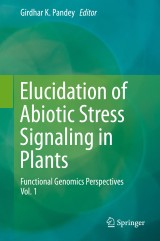Details

Elucidation of Abiotic Stress Signaling in Plants
Functional Genomics Perspectives, Volume 1|
149,79 € |
|
| Verlag: | Springer |
| Format: | |
| Veröffentl.: | 30.05.2015 |
| ISBN/EAN: | 9781493922116 |
| Sprache: | englisch |
Dieses eBook enthält ein Wasserzeichen.
Beschreibungen
Abiotic stresses such as high temperature, low-temperature, drought, and salinity limit crop productivity worldwide. Understanding plant responses to these stresses is essential for rational engineering of crop plants. In Arabidopsis, the signal transduction pathways for abiotic stresses, light, several phytohormones and pathogenesis have been elucidated. A significant portion of plant genomes (most studies are Arabidopsis and rice genome) encodes for proteins involves in signaling such as receptor, sensors, kinases, phosphatases, transcription factors and transporters/channels. Despite decades of physiological and molecular effort, knowledge pertaining to how plants sense and transduce low and high temperature, low-water availability (drought), water-submergence and salinity signals is still a major question before plant biologists. One major constraint hampering our understanding of these signal transduction processes in plants has been the lack or slow pace of application of molecular genomic and genetics knowledge in the form of gene function. In the post-genomic era, one of the major challenges is investigation and understanding of multiple genes and gene families regulating a particular physiological and developmental aspect of plant life cycle. One of the important physiological processes is regulation of stress response, which leads to adaptation or adjustment in response to adverse stimuli. With the holistic understanding of the signaling pathways involving not only one gene family but multiple genes or gene families, plant biologists can lay a foundation for designing and generating future crops that can withstand the higher degree of environmental stresses (especially abiotic stresses, which are the major cause of crop loss throughout the world) without losing crop yield and productivity.
Towards understanding abiotic stress signaling in plants: convergence of genomics, transcriptomics, proteomics and metabolomics approaches.- Molecular approaches in deciphering abiotic stress signaling mechanisms in plants.- Investigation of plant abiotic stress tolerance by proteomics and phosphoproteomics.- Role of cation/proton exchangers in abiotic stress signaling and stress tolerance in plants.- Decrypting Calcium Signaling in Plants: The Kinase Way.- CBL-mediated calcium signaling pathways in higher plants.- Redox regulated mechanisms: Implications for enhancing plant stress tolerance and crop yield.- Role of Mitogen activated Protein Kinase Cascade in Combating Abiotic Stress in Plants.- Small and large G proteins in biotic and abiotic stress response.- ABA Receptors: Prospects for Enhancing Biotic and Abiotic Stress Tolerance of Crops.- Emerging Roles of Auxin in Abiotic Stress Responses.- Biotic and Abiotic Stress Signaling Mediated by Salicylic Acid.- Methylglyoxal, Triose phosphate isomerase and Glyoxalase pathway: Implications in abiotic stress and signaling in plants.- Plant immunophilins: A protein family with diverse functions beyond protein folding activity.- Role of Plant Mediator Complex in Stress Response.- Towards understanding the transcriptional control of abiotic stress tolerance mechanisms in food legumes.- Insights into the small RNA mediated networks in response to abiotic stress in plants.- The Role of Long Non-coding RNAs in abiotic stress tolerance in plants.- Molecular physiology of heat Stress Responses in Plants.- The Omics of cold stress responses in plants.- Drought stress responses and signal transduction in plants.- Physiological and molecular mechanisms of flooding tolerance in plants.- Salt Adaptation Mechanisms of Halophytes: Improvement of Salt Tolerance in Crop Plants.- UV-B Photoreceptors, their role in photosignaling, physiological responses and abiotic stress in plants.- Analysis of signaling pathways duringheavy metal toxicity: A functional genomic perspective.- Nitrogen and Stress.- Signaling pathways in eukaryotic stress, aging and senescence: Common and distinct pathways.- Designing climate smart future crops employing signal transduction components.- Abiotic Stress in Crops: Candidate Genes, Osmolytes, Polyamines and Biotechnological Intervention.- Abiotic stress tolerance and sustainable agriculture: A functional genomic perspective.
Dr. Girdhar Pandey serves as Associate Professor for the Department of Plant Molecular Biology at the University of Delhi South Campus. Dr. Pandey has published and contributed to widely praised books on plant genetics and genomics, including <i>GTPases: Versatile Regulators of Signal Transduction in Plants</i> (Springer, 2015), <i>Abiotic Stress Adaptation in Plants: Physiological, Molecular and Genomic Foundation</i> (Springer, 2010), and <i>Biotechnology in Sustainable Biodiversity and Food Security</i> (Science Publishers, Inc., 2003).
<p>In this volume, several world leaders in plant biology provide insight into ‘Stress Signaling’ in plants with a special emphasis on functional genomics aspects. This book utilizes state-of-the-art research in the field of stress mediated signaling to develop a better and holistic understanding of stress perception, its transduction followed by the generation of response. </p><p>In spite of the advent of different approaches to devise strategies for developing stress tolerant crops towards multiple stress conditions in the field, the success in achieving this goal is still unsatisfactory. Stress tolerance is a very complex process-involving plethora of components starting from stress sensing to generation of final adaptive response. There are several factors, which act as nodes and hubs in the signaling pathways, also serving as master-control switches in regulating a myriad of stress signaling pathways by affecting diverse target genes or gene products to finally bring-about a stress tolerance response. Therefore, in-depth understanding of these master-control switches and key-components in signal transduction pathway will be highly beneficial for designing crop plants tolerant to multiple stresses in the field.</p>
First book to discuss plant signaling from a genetic perspective Diversified group of international contributors Latest research and discussion, previously unavailable in one source?
Diese Produkte könnten Sie auch interessieren:

Handbook of Poisonous and Injurious Plants

von: Lewis S. Nelson, L.R. Goldfrank, Andrew Weil, Richard D. Shih, Michael J. Balick

117,69 €















